LP: What gave you the idea for doing Women of Wonder? Is there something significant about this time in the art world or in society as a whole that seems like this is the time to do such a collection?
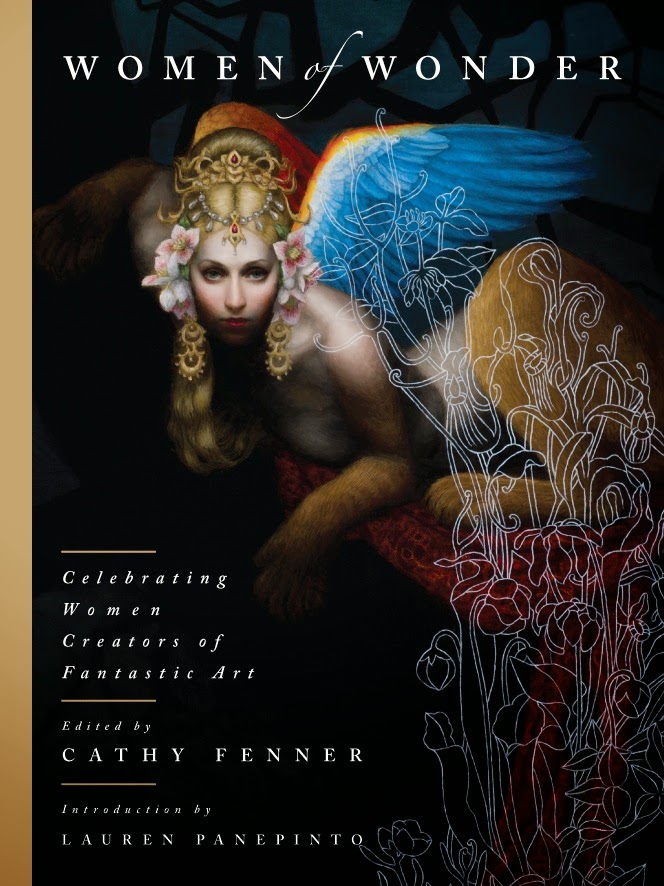
Women of Wonder
Thursday, May 14th, 2015
-By Lauren Panepinto
Holy crap! Spectrum Fantastic Art Live is in ONE WEEK. So very excited to see many of you there. The exhibitors are amazing, the programming is going to be intense, and most importantly, it’s the start of convention season, and that means I get to hang out with some of my favorite people (and most inspiring artists) in the world. I’m absolutely swamped designing Bootcamp onesheets for this year (yes we’ll be posting them online again after the con), so in the meantime, I’m going to give you a bit of a sneak peek into an amazing project I’m involved with: Women of Wonder by Cathy Fenner.
Cathy certainly has her hands full with co-running Spectrum, but in her not-free time she saw an intense need for a book celebrating the women artists working in the fantastic genre. And, as Toni Morrison said, “If there is a book you want to read, but it hasn’t been written yet, then you must write it.” So she did, and collected an amazing amount of work from the past right up to the newest generation of women. I was honored to be asked to write the introduction, which you can read below in spread form, or over at Tor.com.
I had the opportunity to ask Cathy a few questions about her motivation for the project, since I’ll be moderating the Women of Wonder panel at Spectrum next week:
CF: While co-editing the Spectrum Fantastic Art competition and books I had noticed an increasing number of very talented women entering the field who were producing exceptional work. It had been percolating around in my mind to find a way to shine a spotlight on their growing ranks, but I also did not want to overlook the many women artists who have made their mark and influenced the art world in years past, like Rose O’Neill or Sulamith Wülfing. When I approached Tim Underwood of Underwood Books with the proposal he felt like it was a wonderful idea and agreed to publish it. Art books aren’t the easiest things to sell these days so it’s hard to say if WOMEN OF WONDER will be successful or not; I divided the entire advance equally among the featured artists because the book is about them, not me.
LP: Why is it important to specifically to have a collection of just women fantastic artists? Why not just include them in books on fantastic artists in general?
CF: Really it was simply wanting to make people open their eyes. If you ask anyone to name the most popular or best-known fantasy or science fiction illustrator, they’ll most likely mention a very talented man. Who doesn’t love Frazetta, Whelan, or Donato? I know I most certainly do. But look at the art of Karla Ortiz, Forest Rogers, Claire Wendling, or L.D. Austin to name a few: women kick ass just as hard as the men do and this seemed like a great way to remind people and maybe help them shake off their preconceived ideas of who genre artists are and what they can do. Since there have already been many books highlighting the field which included both men and women I felt that a book dedicated specifically to women artists seemed like a natural. Pamela Sargent had edited an anthology in the 1970s (with the same title, as it turns out) calling attention to women SF writers; it seemed to me that something that did the same for women artists was long overdue.
LP: Do you feel fantastic art as a genre is more welcoming or difficult for women artists?
CF: The perception is that it is a male-dominated field; that was unquestionably true in the past, but there has been—and continues to be—a shift occurring in the publishing, gallery, and entertainment fields in which women, either as creators or as art directors, are making their voices heard. Increasingly, people are realizing that art is neither male nor female-centric, but is either “good” or “bad” (depending on how each individual distinguishes one from the other). Action/adventure, pin-up, SF, superheroes: there are no subjects that women aren’t currently painting and drawing with the same authority and excitement as their male colleagues. Although it may have been difficult to stand out in the past, this is a different time and I believe things are changing—and will continue to change—for the better.
LP: Is there a common theme you find running through women’s interpretations of fantastic art that is uniquely female and distinct from the male artists?
CF: Not really. My husband (and Muddy Colors columnist! —LP) Arnie has always said that art is art, regardless of the way it’s created or for whom or what it is created for. With that I mind, I think that, in the greater scheme of things, artists are artists. In publishing the art is driven by subject and content; for galleries it is likewise driven by subject as well as concept. I think each artist, regardless of gender, approaches their art the same way to create something that resonates with an audience. Hopefully, when readers pick up a copy of WOMEN OF WONDER, lightning will strike and their appreciation for all types of art and artists will instantly get a lot bigger.
———————-
You can read a longer interview with Cathy on this project at the SF Signal blog.
You can get copies of Women of Wonder at Spectrum, or order online.
If you’re coming to Spectrum, come check out the Women of Wonder panel with me, Cathy, Rovina Cai, Karla Ortiz, Tran Nguyen, and Forest Rogers, Saturday from 2-3pm.


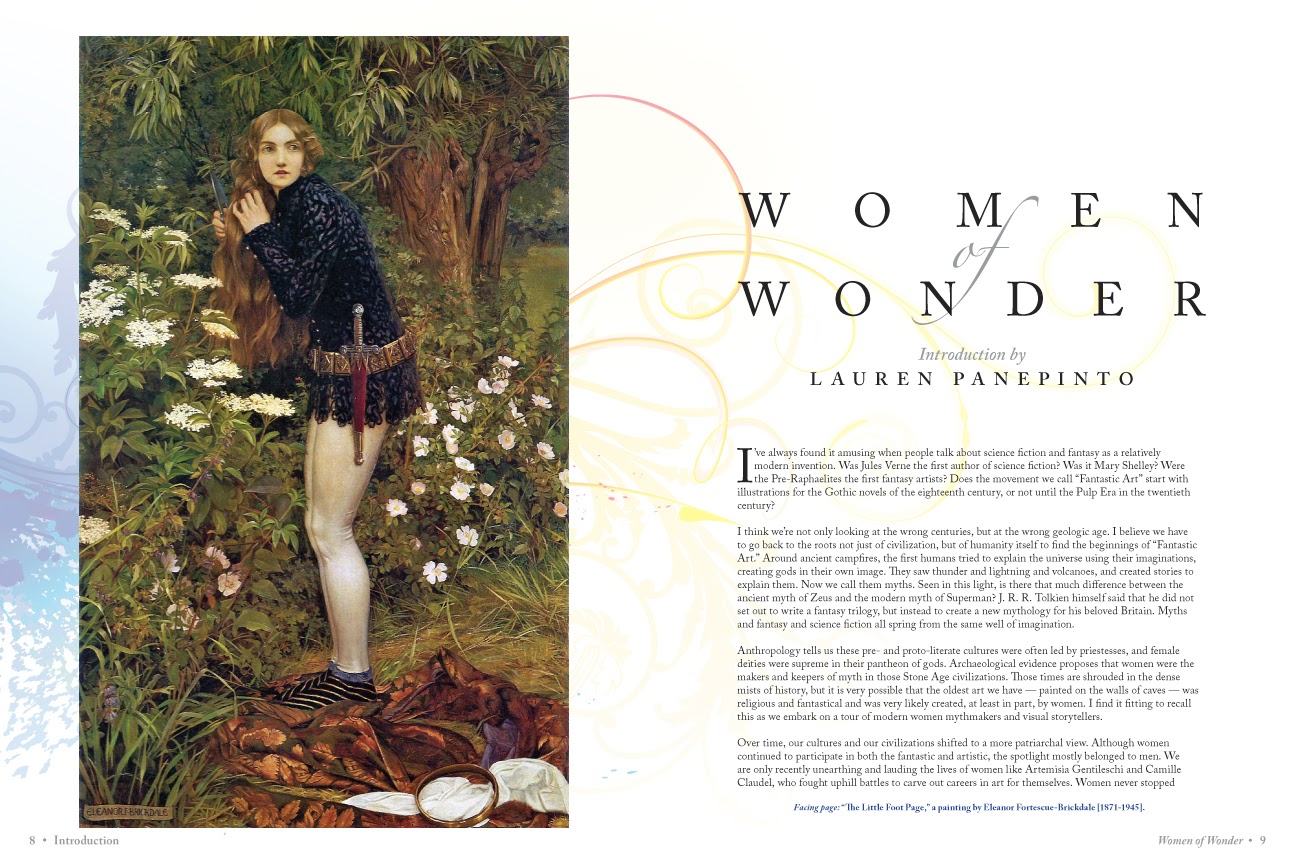
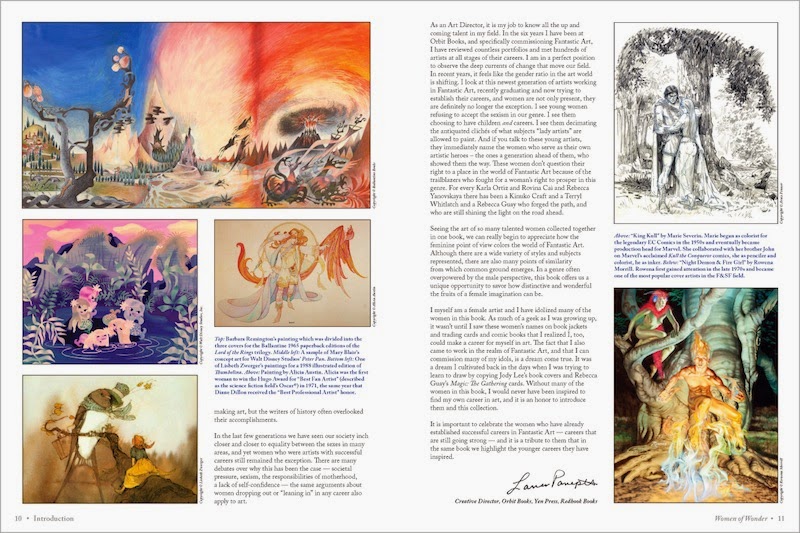
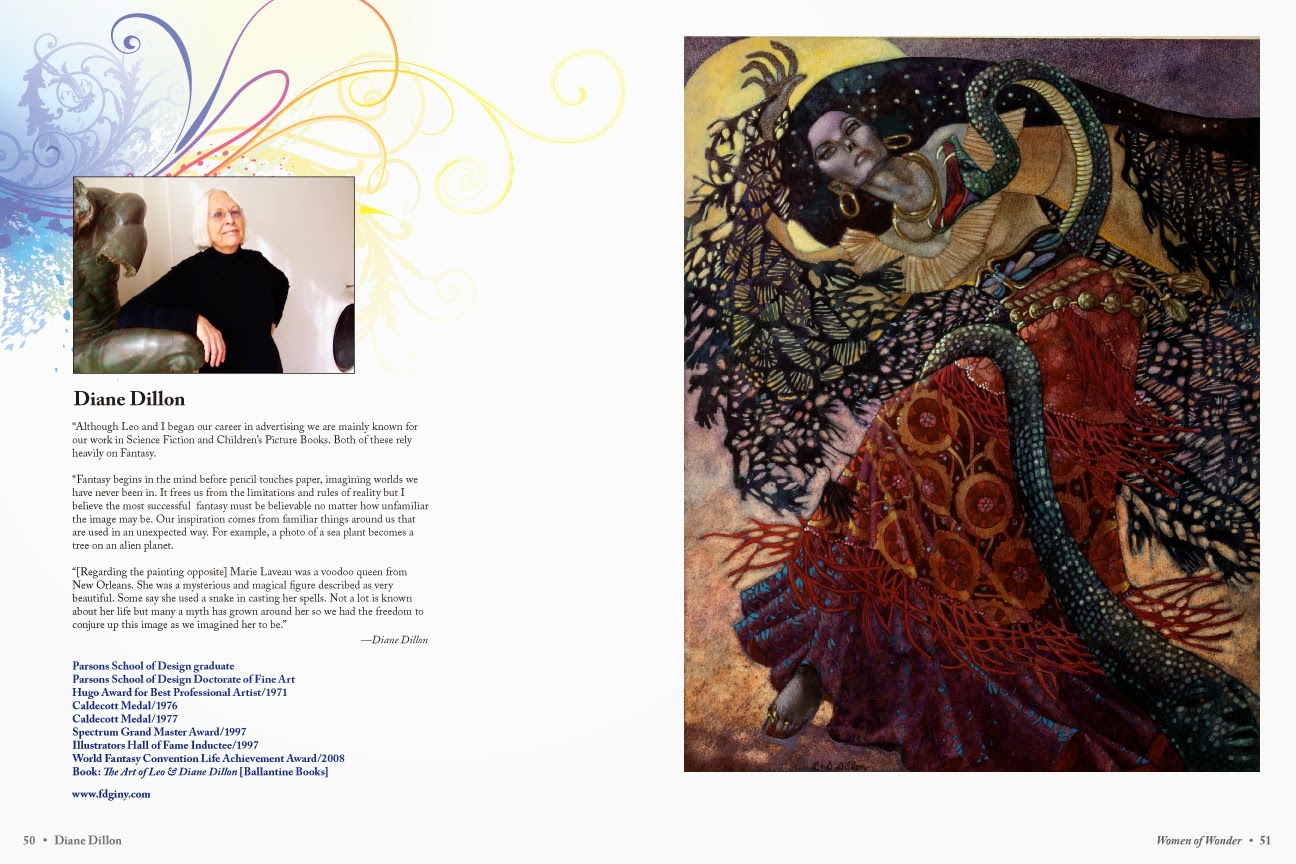
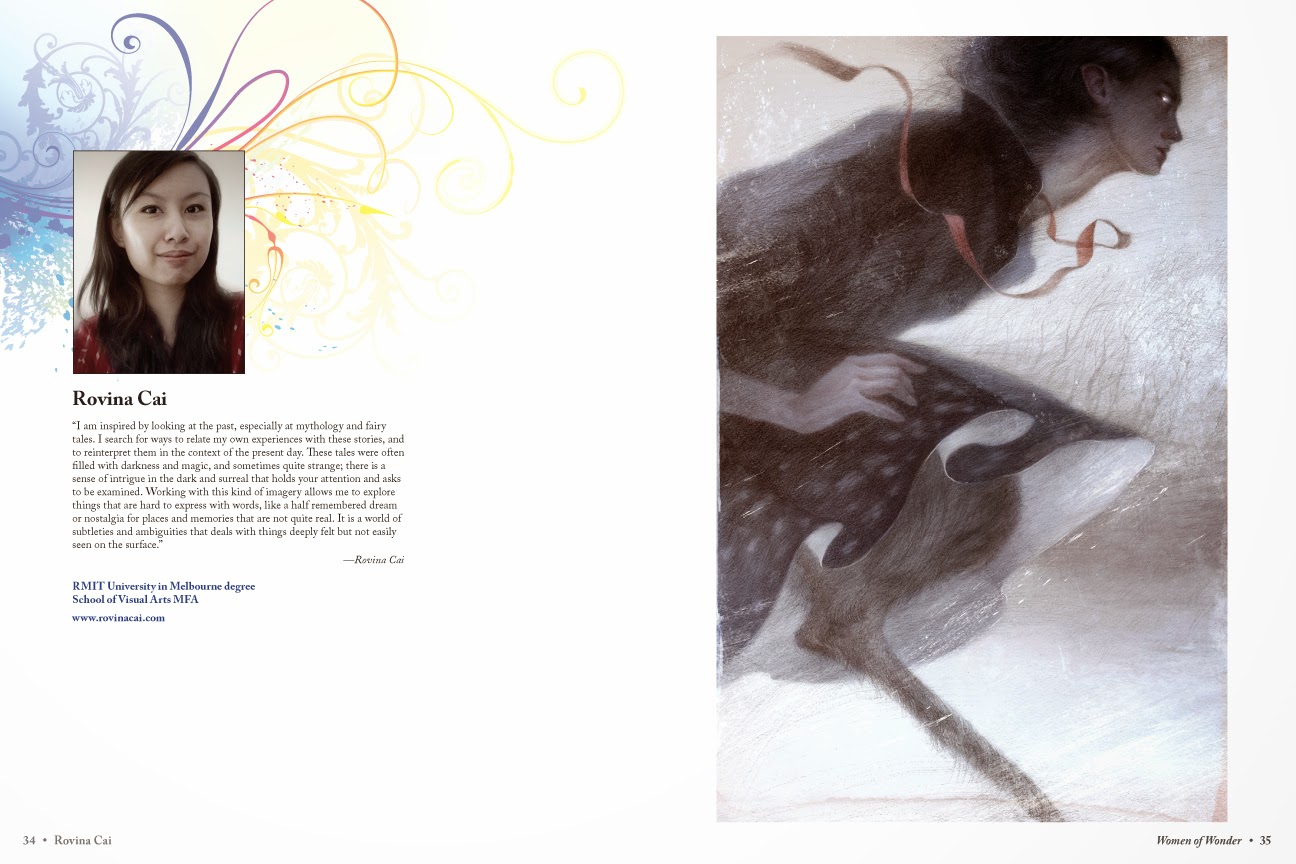

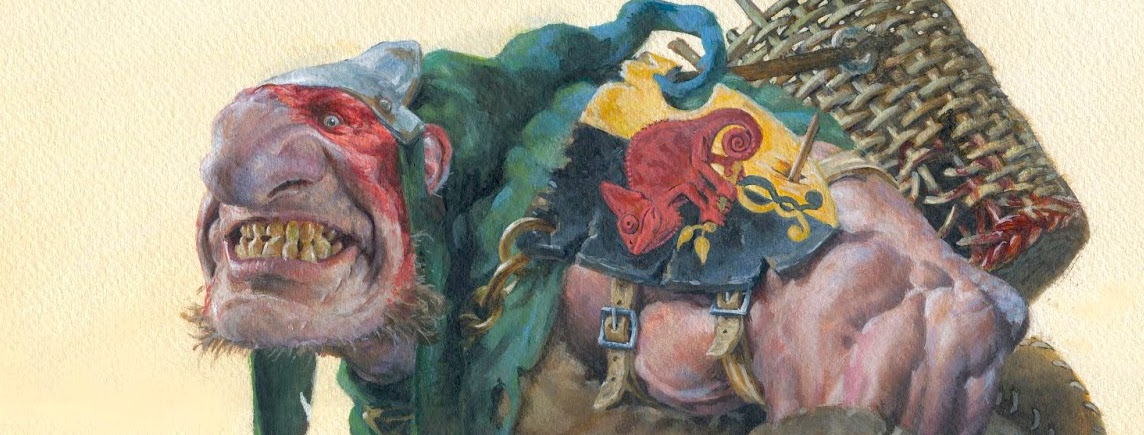
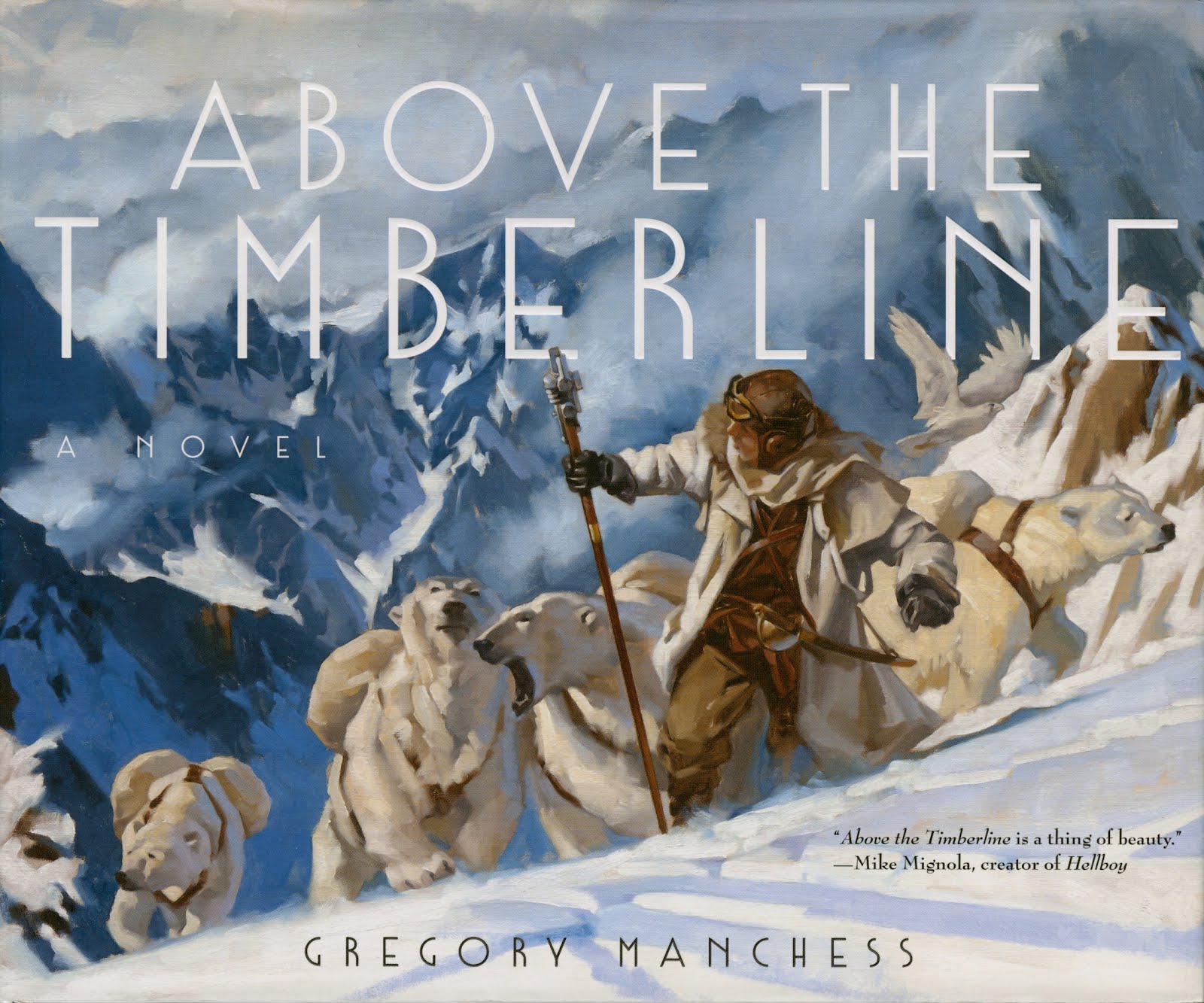
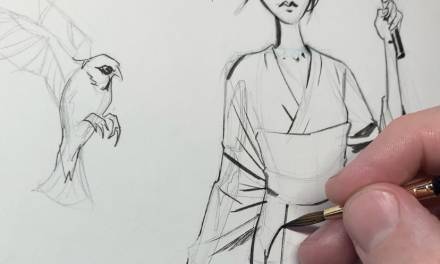
As a strictly, ah, um, unbiased reader (*cough*)…WOMEN OF WONDER is simply killer. The art is exciting in its diversity and the artist statements (or bios) are revelatory and occasionally eye-opening. Solid work by my wonderful wife, great intro by the esteemed Ms Panepinto, stunning art by each of the featured artists…I'm ready for the sequel. 🙂
This looks like a good book and kudos on it, I like the idea of a collection of art made by females only (to get a unified feel of their preferences in their work), but I thought that the top artists in the fantasy field are considered as such based on the fact that their work is transcendentally great and not just “kickass”. Implying that it's because of their gender and claiming this book is an effort to dispel that imaginary notion is kinda contradictory to the last answer (minus the closing statement) in the interview. I don't think the crushing majority of people (at least on my side of the planet) who like and buy fantasy art care about the artist's genitalia.
PS: By the term 'female' I mean anyone with two X chromosomes in the 23rd pair of their karyotype and it follows that 'male' would be anyone with an XY pair.
I think though what you've hit on is less to do with anything related to gender and more to do with the age old debate of what makes a Master, a Master. Something that gets brought into that disagreement is that people who love their craft and respect skillful and quality work want to believe that good work always gets noticed and gains the respect it deserves. The painful reality is we might not see all the transcendentally great pieces and we might not recognize all the transcendentally good artists, especially so while they are still alive.
In this particular case we can safely completely ignore the whole argument whether we should attribute something malicious to some imbalance in the field. We can say this book will help generate confidence in new women artists, helping their numbers in that way, and that already justifies its existence. Not to mention it will also get exposure for some great artists. It's such an easy and crippling lie to tell yourself as a beginner artist (or have told to you) that you cannot succeed because of 'x' and so you shouldn't even try. Anything that alleviates that seems like an awesome idea. At the very least, this book exposes that you can succeed and be recognized as a great [fantasy artist] as a [woman]. If anything we need more books to fill in the blanks with different things. Arguing whether the 'great' should be capitalized or not is really arguing over semantics or trying to discuss what it really means to be a master. *cue Pokemon music*
We need more discrimination and negative criticism in the art field to decrease oversaturation and decrease the inflated college fees.
Women of Wonder is a beautiful celebration of the imagination and of exemplary creators . . . who just happen to be women.
Mica
Online Dating Plenty of Fish Review
dont tease me Arnie I am DYING to see a finished copy!
There's actually a much bigger conversation going on in the field right now, which you may not be hearing yet as it percolates up thru the internet, but the next issue of ImagineFX is going to have an article on it too: I'm simplifying here, but there's an issue that most women are brought up by society in ways that hamper their ability to self-promote. From early childhood women are taught to play nice, not stick out, don't be aggressive, don't be confident. The intense scrutiny on women as primarily sexual objects in advertising and mass visual culture teaches us that we cannot risk sticking our necks out unless we are perfect. This all contributes to women needing to dig themselves out of that ingrained hole to get to the level of comfort in self-promotion that many men begin at. Thus over time, women artists have had to fight twice as hard to be seen and noticed, and it's twice as important to promote women artists as a group so that young women can be exposed to role models and mentors. THAT'S why it's important to call them out as a group.
We all know that skill & talent is only half of a successful art career. The other half is business and promotion. There are plenty of geniuses of any gender who have the skill and not the promotion skills and we never hear of them. But on the whole it is a more institutionalized problem for women. So I see it as evening the playing field to go a bit further to promote them beyond just the main gender-blind places and books.
As a woman artist, I also can't stress enough how important and inspiring it is for girls to see women doing the thing they want to do. It's sometimes hard for a guy to understand, but not being the default, you don't imagine that you can BE a success if you're not seeing women being successful. I wouldn't be an artist if it wasn't for many of the women in this book.
This is a huge issue, and not one I'll be able to do justice here, so stay tuned in the near future for a more full convo.
Agreed. Every woman in this book is as worthy as any guy to be in a book. This just happens to be a collection of artists under a category…it's not that different than doing a book on just French Fantasy Artists, or Artists only working in Horror. They're all arbitrary categories specifically chosen to promote something. Here we're promoting the idea that women artists are as kickass as men artists are, but also showing them together so that we can see similarities and patterns that may or may not show a more feminine viewpoint of fantastic art.
I'm not denying that many won't get the praise they deserve, but that wasn't my point. I was pointing to the interviewees supposition that we never think of female master artists because of preconceived notions regarding the gender of most fantasy artists, and that's not true.
We think of specific names because these people happen to be the very best, have influenced the rest of us and most of the artists thus far were males by no reason other than the fact that this was a male-created field, period.
But, the “market” and time do have a tendency to expose those who are the “creme dela creme” regardless of gender or our views as to what consists a Master, you cannot get more objective than that. When a female comes along and makes some Death Dealer quality paintings that are timeless and blow our minds every time we look at them, I have no doubt we will mention her too. There's no gender issue there like she alluded to.
Now, I disagree that this book will do anything beyond inspire those who already like this kind of art. If the fantasy/sci-fi market as a whole isn't enough to inspire more females to try and become professional artists then nothing will, they just don't want to. Almost all artists had and have to ignore or fight societal views on one becoming artists. Females don't deserve special “help”, they are just as capable of making it on their own. And if inability to handle the exposure/business side of things stands in ones (regardless of gender) way, well, tough, go home and do something else.
As for what prospective artists say/hear that drags them up or down, it's their own problem. Some of the artists in this book, or the women who are it's target audience, probably have the thousands of dollars to pay for art education, or at least have a $150.000 home to study in. Why worry over them when people live in countries where there's no education and no chance of making enough money to ever afford it, where the only solution is to struggle for decades to achieve what these females succeeded at in a few years because they were richer? A “book” in support of us wouldn't help, nor is there any special interest group lobbying for it. And at least in my case, I feel better without it.
The only thing needed to be said regarding the creation of this book was “We rounded up a bunch of female artists that do great work and thought to make a book out of it so people can see what these artists tend to draw/paint and how, just for fun and to make a buck”. This sociological gynocetrism has it's limits, and in at least this field in the present day it is a non issue. The only justifiable explanation I can think of for linking the book to such jargon is to try and get into the SJW circles and sucker them into buying a few copies.
By the way, I just published and haven't seen the replies above, so I'll read them later and see if there's more to talk about. Regardless, these discussions are nice. At least we can have that. 🙂
Yes it is clear you either didn't read or didn't understand my response.
Another guy speaking for women. How can a man claim what is happening to women a non-issue? But even if you perceive it as a no-issue the reason is that women have been fighting for a long time to make it so. It doesn't just happen. So if you a have a cause, people who achieve success in underdeveloped countries or with little means, the champion it. But don't criticize those who have been working long and hard championing very real issues of their own.
exactly, Bill. one good cause doesn't negate all the other good causes.
OK now that I have seen some of the other replies (I was writing my own while working, over a few hours, so I was replying only to Syrval) I can give a position. This is the short version, cause it's late here. Please forgive any mumbled, laconic writing.
First let me repeat, there is no problem in creating a collection of works, whose creators also happen to be women. No one's against that. Nor am I against promoting a mass of work that a specific team of people find to be good, have a common thread or threads and are worth promoting.
Now to address your point Lauren, I haven't seen anything specific on the discussion you are mentioning, as far as it pertains to the field, but I've been around said discussions online which talk about the generic theorems you mentioned, as well as in the university I study at (those are free here).
But, they aren't convincing. To assume men are more aggressive negotiators is to assume they don't care about losing their jobs, having problems in the workplace, that they are violent rapist types etc, while you have to assume women are mindless programmable dolls who will do what's been fed into them regardless of their education or needs. You must also assume that employers aren't out to exploit workers regardless of gender, that they are open to spending more money on workers who ask for it, and that there aren't 1000 cheaper replacements for every one worker.
Of course this isn't how it is. Women aren't in the unfair predicament you present them to be and men aren't as bold or aggressive as you would like. (I'll explain this as best I can in another message). But, just like women aren't generally aggressive in the workplace, neither are men, at least without reason.
Men aren't “conditioned” into negotiating for more money. Men are forced into it. In their teens they have to figure out how to pay for a car to attract the female who wants to be chauffeured around. In their 20's they have to pay for the house they live in to not look like the losers women stay away from and in their 30's + they have to pay for the wife who's nagging 15 hours a day and junior who's growing up fast and will need college money soon. Some men have to even work overtime or ask for a raise to pay for child support or alimony. Women have less of these obligations and less stress about them, while in the males case it's him trying to attract mates.
The dude who's working in the basement of an IT company however, spends his free time watching movies and playing video games and simply doesn't care to pamper the over inflated sense of female entitlement to the preconceived male archetypes. He doesn't ask for more, he doesn't work overtime unless he feels like it and doesn't risk his own safety for a wife. These guys were few, but are multiplying, especially in the 20-30 age group.
So, to wrap that part up, the proposal that women won't do this or that in general because they aren't encouraged, is false. Look at the STEM fields. How long has the US been feeding money in the system, begging women to go into those fields. They just aren't, period. They don't want to, they don't like it. Why? Well, biology is one reason for sure. Neuroscience tells us that the brains of males and females are dimorphic, and the more we learn about these differences the more we will understand why our behaviors are so different at times, but the undeniable fact remains, that in their majority male and female brains are different, that's it.
On the other hand, I will accept the supposition that some females may indeed need female role models and there is nothing wrong with that. However, one can never ever be certain (unless there's some kind of constant study I suppose) that the sex of an artist is of importance to females who, affected by said artists' art, become artists, or anything else for that matter. But, promoting said products as some kind of pill that will reform society from some imaginary sickness that affects one half and makes it suppress the other half is just too much.
There's more to be said for sure, but I can't say more because you and others must have a chance to retort and I am very tired. But I am interested in the discussion.
Well I think Lauren should thank you. You've made her point with your comments. Man, where and in what world do you live?
OK I'm going to ignore all the ad hominem again and say that our major difference is that I am open and willing to change my mind and be convinced of the truth of the opposing argument, if it's there. You guys seem to not be willing to. But I am going to try and be my own judge and see if I can ask some questions.
At the very best, both Lauren's thoughts and mine are just ideas based on our personal observations, individual experiences and criticisms, nothing more. There is no scientific evidence to back our claims (that I know of). We can just look at wage statistics and interpret the data from our own stance and maybe use a series of personal experiences and anecdotal stories to support our view, but that's about it. The general truth is more in the middle or not on the same plane.
I argued from logic and the general experience most of us may have as to the actions family men of the past had to make to support the family. I don't know of any study of how many men would work overtime, get a second job or negotiate higher wages, but at least it's an experience most males and females may share, and a conclusion they can logically deduce. The girl conditioning theory is just based on the suppositions or realities of a few women coupled with an 'equality of outcomes' brand of feminism. But, if there's evidence, objective scientific evidence, not some sort of feminist backed study starting with a conclusion, then I'd love to see it and concede with glee (mind you, this is not supposing that there were never issues women faced).
The only differences between the two opinions are a) Lauren is a woman and I am a man and b) Lauren's stance sprouts and is supported by feminist circles while mine has no special interest group behind it.
So my question to you is, why do you take one stance over the other and totally set aside the possibility that maybe both happen in varying degrees or none? Or how are you so certain that what I propose is such an impossibility that it somehow (and I would love you to explain how) proves Lauren's point?
And to add some rhetorical questions regarding the book's aim, even if I am purposefully going to more extremes, but let me just ask to see if I can get an opinion. Why is it so important to create some sort of special support platform for females who may be thinking of trying to become professional artists? Won't the ones who have the passion and the guts to make the sacrifices and work in this dog-eat-dog field do so anyway? You know, like the males. Why is that any good for the field? The fact that, say, Julie Bell is great and kicks ass makes a new male artist feel like not trying because he's not that good yet (I'm one of them), just as much as it does a girl, and his chances of not trying are just as high as a girl's. Why does the fact that Julie Bell is a woman matter?
There is no 'female artists and male artists', there is only good art and bad art. Art is one of the most indiscriminate fields, wherein an exceptional artist will always be held in high esteem regardless of their sex.
“Why do you take one stance over the other and totally set aside the possibility that maybe both happen in varying degrees or none?” Because it is convenient to assume that the reason why men are more prominent in the art field is because of discrimination, and that there is no other factor involved that would constitute towards this outcome. Michael, you are under the supposition that this fad feminist cause is based on facts and logic, not an emotional reaction which could only be construed as a self-inflicted '1st world problem'. The best action to take is to accept the book at face value, as being but a selection of, what are ultimately, pictures – a source of visual enjoyment, as all art is. Perhaps this could lead you to form some sort of opinion on the general performance of women in the fantasy art field, but I wouldn't go that far. However, to argue that the purpose of this book is based on foundationless claims is to commit career suicide.
John, we agree, the art field is exactly that, an indiscriminate field. I don't think there is one art director out there who would look at someones portfolio, see work that can be used and then reject it based on the sex of the artist. Like I said, at best, these are just opposing opinions with no supporting evidence other than personal experience, which in the case of social engineering counts for nothing, unless the social engineer is a dictator. However my supposition of intelligence, at least in the art field, lies in the naiveté notion that sci-fi/fantasy artists are a little more investigative and open minded as a group, but dum spiro spero.
If career suicide is the case of expressing not being convinced yet by some of the feminist claims -claims which are adopted by some artists and ADs who are openly feminist and show elegant spite towards anyone of differing opinion- and this deviation of opinion resulting in the clique discriminating against said person on the grounds of anything but artistic merit, then so be it, I want my freedom of speech. At least in such a case the one who is expressing not being convinced is not the one making the unfair discrimination the whole of non-feminist society is being accused of making by feminists.
Still, the art published in the article is beautiful. Not my cup of tea, but beautiful nonetheless.
Look Michael, I am not going to step into Lauren's shoes and speak for her because I can't. But she, and other with whom I've been involved in discussions, seem to be saying that they have experienced certain things and know other women who have and just want people to listen. They feel that there is reason enough to inform other people about it and try to bring the problem to light. Changing minds like yours and many others I've seen is probably not likely but all of the “want” of empirical knowledge aside, experience says there is a problem. You don't seem to know it because you are not a woman. Your experience tells you that there are things wrong with the world, good then do something. Lauren and others are, even if the steps might be small, are doing something in a world with which they are very familiar. Creating a “special” platform for female artists coming into this industry may not seem important to you but why must you argue that it is not important to others? You seem intelligent enough to know that the playing fields outsiders see as level are no level at all to those in the minority. The majority (or empowered) can't really put themselves in the place of the minority (or disenfranchised) but we can listen when they speak. Sorry for stepping in Lauren.
As the old saying goes, life is not fair. It is incredibly naive for anyone to believe that everything is equal for everyone or that everyone thinks the same way about everything. Everybody has their preconceived ideas about anything one might care to mention and it is only through education and an expansion of our world purview do those preconceptions evolve.
Good work often isn't enough to achieve success in the art world. A lot of other factors come into play. Illustration, regardless of reality, has long been perceived as a male-oriented profession and many decisions as to who gets what jobs have been (and in many cases still are) made based on traditional viewpoints if not benign prejudices. Both sexes are guilty of prejudices; it's a sad part of human nature. Any opportunity to educate others and maybe help change those prejudices is a good thing. Cathy's book isn't a feminist doctrine; it is merely a reminder that there are more women working in the field creating memorable work than we might realize. That's as good a reason to do a book as any.
Logic, Michael? Whose? Yours? Please. Such a statement is faulty all the way around and ignores the real world experiences, feelings, and observations of others. You don't know what Lauren has experienced as a working professional woman; you have no idea what other women experience beyond what you might read. Reading about it is not living it. I've worked with and for women my entire professional career and I can not for a single moment pretend to know how they feel or think. Hell, I don't understand the way guys think half the time–but I'm smart enough to know that when I talk, I'm only talking from my perspective and more often than not, that's not the way others think.
I wonder, Michael, if this were a book devoted to African American or Latina or Asian artists you'd feel as comfortable posting your cynical, sometimes ignorant and condescending observations here. I suspect not.
I'm going to repeat, a book of art by females only, and promoted, no, screamed as such is no problem. If it encourages a girl or two (or a guy) to be an artist, I'm all for it, I just doubt it will be for the reasons and under the circumstances you people feel it would. If it lets some people, who for some perverted reason thought that women cannot be artists, know that there are women who are artists (and really, please, I beg of you, point one such person to me so that that person can explain why they ever had such an idea in 2015) great. I never said I was against that. Nor do I say that one should ignore the personal experiences and troubles a person may have faced. Give that person sympathy, encouragement and friendship.
My issue arises from the reasoning that a specific premise equates a general conclusion. This is why inductive reasoning is invalid outside mathematics because at best, it can indicate a probable conclusion, not an absolute one, and only after you've had a large sample.
But still, I would say that if a study or series of studies could produce an indication that a) there MAY be such a societal conditioning (not even looking for a definite) and that b) the MAJORITY of females (<50%) are absolutely caused to under perform because of this, then I not only would concede the point of this inductive conclusion, but also state that it's good for such work to advertise such a purpose just in case, and promote it too. But so far, to my knowledge, there doesn't seem to be anything even remotely indicating such a trend in the general population, let alone in the art field specifically. This does not exclude that there aren't fields where there may be a generalized type of discrimination or a few cases within each field. This all means that until there's some sort of proof, unfortunately, this is all just individual bad experiences and these people are just projecting.
And for goodness sake, I am not saying that people shouldn't speak out about their bad experiences, even if it's just one person. Nor am I saying I am ignoring anyone's bad experiences, I'm not. But to take a statistically insignificant number of cases and state with utmost certainty that that is the definite normal and truth and that something has to be done, is illogical. I have been sexually harassed in the workplace many times since my first job when I was 18. What? Am I supposed to cry “wolf” and suppose every guy has his female boss hitting on him? I was sexually harassed in the army by 2 superior officers, tell me how the hell you handle that when you have no human rights and are supposed to just follow orders? And to set it straight, not only was I scared every time, but I had a hard time avoiding these people, especially in the army.
Do I suppose that the frequency with which this happens to females is the same as with males? Not on your life…I know it happens more, that's why I support women calling out the fact, within a specific threshold of what is considered harassment, even though I have heard personally of females being harassed in the workplace more than males (I accept that this is a statistical anomaly).
I'm sorry if I prefer definite facts to feel-good emotions and pampering of people (most of the time), that's what one must do on a personal level. On a collective level we first must look at data, cold hard facts. In any situation the feelings of a person who is useless to you are irrelevant. Give him a shoulder to cry on, but if he can't fulfill the requirements that's it.
Though I am inflexible as to what I think matters, facts over feelings on a collective level, I can be flexible and understanding to what I see happening around me. I've stated what would convince me of the indoctrination of women and men in this matter, and if there's some study or something I can look at, please show me and I'll be more than happy to say you are absolutely right. Why do any of you think I wouldn't accept the claims of generic female conditioning if they are proven facts? I would, but not just based on a few people's word.
And no, I would be opposed to African American or Latin or Asian artists being promoted on the grounds that they are somehow discriminated against or are indoctrinated by society to not become fantasy artists just as much as I would if they were Greek-American like I am. Unless the job changes from an AD looking at a faceless portfolio and deciding the artist can be used or not, to a procedure where the AD looks at the background of the artist first and decides on that coupled with the art, I can see no reason to surmise that this profession can be discriminatory in the majority of cases
Sounds like the perfect research project for you, Michael, since you seem to already know what it's like to be a woman artist in the U.S. I'm sure it will be illuminating.
Hard to argue with rock solid logic and statistics. We probably should have done that back when we had slavery here. Never would have fought that annoying war. Surely no one can believe that in order to take up a cause that first 50% of the population must be oppressed. But I'm getting ready for one of my favorite weekends of the year so no more time for this. I agree with Arnie, by all means do a study Michael before you take up the cause.
Why is it bad that I am skeptical of something for which I have nothing but hearsay and experiences that differ from yours? Why would I be so gullible to believe in this on blind faith? Or does the fact that I am male nullify my opinion and experiences? Lauren said she'd elaborate soon and I am interested, so why are you telling me off if you are so certain of the validity of this thing?
Sorry if my experience of women and girls has taught me that 9 out of 10 are much tougher than those you are talking about, but even if it is a coincidence that doesn't make me wrong or you right, yet.
Again, my doubt is with the generic statement that ALL females are supposedly being brainwashed into growing up to be societal drones, which despite it being an extraordinary claim, I am still willing to be convinced of. Thanks for the dialogue though.
PS:Sorry about the triple post, PC got stuck.
Great thread guys, good job, keep it up, proud of you.
The comments are now at 30 so let's keep it at this nice round number.
Man, after this, I'm totally going back to just lurking. All I was trying to get at was that good art inspires people. And people tend to identify with people most like them, whether that's thinking like them, having a similar background or some other common thread. So a book on good female artists would more than likely inspire some other female artists… which is what I understood Cathy's closing comment to mean. More good artists is always a good thing. Right? Except I guess for 'oversaturation and the inflated college fees' that one guy mentioned but meh.
Really I guess its that several opinions here seem to differ on whether its okay that person might require any outside encouragement or help with mental sticking points they might have. I'm on the side of 'you can still be an artist even if you have confidence issues' and that's completely independent of where those issues come from. And if a book helps inspire you through a mental block then, yay! I don't see why it needs to be more complicated than that other than to argue with people.
PS John Doe: Also, no, odd numbers are clearly superior.